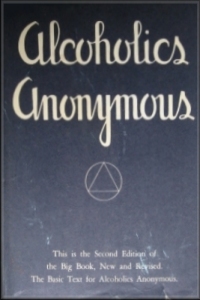
Alcoholics Anonymous (AA) is a global peer-led mutual aid fellowship dedicated to abstinence-based recovery from alcoholism; which AA believes is incurable but a path of recovery is available through its spiritually-inclined twelve-step program. AA's twelve traditions, besides stressing anonymity and offering membership to anyone wishing to stop drinking, establishes AA as free to all, non-professional, non-denominational, apolitical and unaffiliated. In 2020 AA estimated its worldwide membership to be over two million with 75% of those in the U.S.—its country of origin—and Canada.
Twelve-step programs are international mutual aid programs supporting recovery from substance addictions, behavioral addictions and compulsions. Developed in the 1930s, the first twelve-step program, Alcoholics Anonymous (AA), founded by Bill Wilson and Bob Smith, aided its membership to overcome alcoholism. Since that time dozens of other organizations have been derived from AA's approach to address problems as varied as drug addiction, compulsive gambling, sex, and overeating. All twelve-step programs utilize a version of AA's suggested twelve steps first published in the 1939 book Alcoholics Anonymous: The Story of How More Than One Hundred Men Have Recovered from Alcoholism.

Narcotics Anonymous (NA), founded in 1953, describes itself as a "nonprofit fellowship or society of men and women for whom drugs had become a major problem." Narcotics Anonymous uses a 12-step model developed for people with varied substance use disorders and is the second-largest 12-step organization.
The Twelve Traditions of twelve-step programs provide guidelines for relationships between the twelve-step groups, members, other groups, the global fellowship, and society at large. Questions of finance, public relations, donations, and purpose are addressed in the traditions. They were originally written by Bill Wilson after the founding of the first twelve-step group, Alcoholics Anonymous (AA).

Sexaholics Anonymous (SA) founded in 1979 is one of several twelve-step programs for compulsive sexual behavior based on the original twelve steps of Alcoholics Anonymous. SA takes its place among various twelve-step groups that seek recovery from sexual addiction: Sex Addicts Anonymous, Sex and Love Addicts Anonymous, Sexual Compulsives Anonymous and Sexual Recovery Anonymous. Collectively these groups are referred to as "S" groups since all their acronyms begin with that letter: SA, SAA, SLAA, SCA, SRA.
Jimmy Kinnon, commonly known as Jimmy Kinnon or "Jimmy K.", was one of the primary founders of Narcotics Anonymous (NA), a worldwide fellowship of recovering addicts. During his lifetime, he was usually referred to as "Jimmy K." due to NA's principle of personal anonymity on the public level. He never referred to himself as a founder of NA, although the record clearly shows that he played a founding role.
Pagans in recovery is a phrase, which is frequently used within the recovery community, to describe the collective efforts of Neopagans as well as Indigenous, Hindu, Buddhist, and other like-minded groups, to achieve abstinence or the remission of compulsive/addictive behaviors through twelve-step programs and other programs, such as Alcoholics Anonymous, Narcotics Anonymous, Overeaters Anonymous, Al-Anon/Alateen, etc. These efforts generally focus on modifying or adapting the twelve steps to accommodate the Pagan world-view as well as creating Pagan-friendly twelve step meetings either as part of a preexisting twelve-step program or as independent entities.

Marijuana Anonymous (MA) founded in 1989 is an organization and twelve-step program for people with common desire to maintain abstinence from marijuana.
Overeaters Anonymous (OA) is a twelve-step program founded in 1960 for people with problems related to food including, but not limited to, compulsive overeaters, those with binge eating disorder, bulimics and anorexics. Anyone with a problematic relationship with food is welcomed; OA's Third Tradition states that the only requirement for memberships is a desire to stop eating compulsively.
Crystal Meth Anonymous (CMA) is a California-based non-profit, public-benefit corporation founded in 1994. The members of the fellowship of Crystal Meth Anonymous work a twelve-step program of recovery with recovering crystal meth addicts. Participants in local groups meet in order to help others recover from methamphetamine addiction. CMA advocates complete abstinence from methamphetamine, alcohol, inhalants, and all other psychoactive drugs not taken as prescribed.
Sex Addicts Anonymous (SAA) is a twelve-step program founded in 1977 for people who want to stop their addictive sexual behavior. There also exists a group known as COSA, for those who have been impacted by others' sexual addiction.
Sex and Love Addicts Anonymous (SLAA) is a twelve-step program for people recovering from sex addiction and love addiction. SLAA was founded in Boston, Massachusetts in 1976, by a member of Alcoholics Anonymous (AA). Though he had been a member of AA for many years, he repeatedly acted out and was serially unfaithful to his wife. He founded SLAA as an attempt to stop his compulsive sexual and "romantic" behavior. SLAA is also sometimes known as the Augustine Fellowship, because early members saw many of their shared symptoms described by St. Augustine of Hippo in his work Confessions. COSLAA is another twelve-step fellowship created to support the family members and friends of sex and love addicts.
Nicotine Anonymous (NicA) is a twelve-step program founded in 1982 for people desiring to quit smoking and live free of nicotine. As of July 2017, there are over 700 face-to-face meetings in 32 countries worldwide with the majority of these meetings occurring in the United States, Iran, India, Canada, Brazil, the United Kingdom, Australia, Russia and in various online community and social media platforms.. NicA maintains that total abstinence from nicotine is necessary for recovery. NicA defines abstinence as “a state that begins when all use of nicotine ceases.
Drug addiction recovery groups are voluntary associations of people who share a common desire to overcome their drug addiction. Different groups use different methods, ranging from completely secular to explicitly spiritual. Some programs may advocate a reduction in the use of drugs rather than outright abstention. One survey of members who found active involvement in any addiction recovery group correlates with higher chances of maintaining sobriety. Although there is not a difference in whether group or individual therapy is better for the patient, studies show that any therapy increases positive outcomes for patients with substance use disorder. The survey found group participation increased when the individual members' beliefs matched those of their primary support group. Analysis of the survey results found a significant positive correlation between the religiosity of members and their participation in twelve-step programs and to a lesser level in non-religious SMART Recovery groups, the correlation factor being three times smaller for SMART Recovery than for the twelve-step addiction recovery groups. Religiosity was inversely related to participation in Secular Organizations for Sobriety.
Workaholics Anonymous (WA) is a twelve-step program founded circa 1983 for people identifying themselves as "powerless over compulsive work, worry, or activity" including, but not limited to, workaholics–including overworkers and those who suffer from unmanageable procrastination or work aversion. Anybody with a desire to stop working compulsively is welcome at a WA meeting. Unmanageability can include compulsive work in housework, hobbies, fitness, or volunteering as well as in paid work. Anyone with a problematic relationship with work is welcomed. Workaholics Anonymous is considered an effective program for those who need its help.

LifeRing Secular Recovery is a secular, non-profit organization providing peer-run addiction recovery groups. The organization provides support and assistance to people seeking to recover from alcohol and drug addiction, and also assists partners, family members and friends of addicts or alcoholics. It is an abstinence-based recovery program with three fundamental principles: sobriety, secularity and self-empowerment. The motto of LifeRing is "empower your sober self."

Secular Organizations for Sobriety (SOS), also known as Save Our Selves, is a non-profit network of autonomous addiction recovery groups. The program stresses the need to place the highest priority on sobriety and uses mutual support to assist members in achieving this goal. The Suggested Guidelines for Sobriety emphasize rational decision-making and are not religious or spiritual in nature. SOS represents an alternative to the spiritually based addiction recovery programs such as Alcoholics Anonymous (AA). SOS members may also attend AA meetings, but SOS does not view spirituality or surrendering to a Higher Power as being necessary to maintain abstinence.
Food Addicts in Recovery Anonymous (FA) founded in 1998 is a program of recovery based on the twelve steps of Alcoholics Anonymous. FA members are men and women of all ages. Some have been obese; others have been severely underweight, bulimic, or so obsessed with food or weight that normal life was difficult or impossible. The common denominator uniting members of FA is addiction and a relationship with food that parallels an alcoholic's relationship with alcohol. The program offers the hope of long-term recovery, evidenced by members who have continuously maintained a normal weight and healthy eating for periods of twenty-five or even thirty years.

Alcoholics Anonymous: The Story of How More Than One Hundred Men Have Recovered from Alcoholism is a 1939 basic text, describing how to seek recovery from alcoholism. Written by William G. "Bill W." Wilson, one of the founders of Alcoholics Anonymous, and many of the first 100 members of the group, the composition process was collaborative, with drafts of the book being sent back and forth between Bill W.'s group in New York and Robert Holbrook Smith, the other AA founder, in Akron, Ohio. It is the predecessor of the seminal "twelve-step method" widely used to treat many addictions, from alcoholism, heroin addiction and marijuana addiction to overeating, sex addiction and gambling addiction, with a strong spiritual and social emphasis. It is one of the best-selling books of all time, having sold 30 million copies. In 2011, Time magazine placed the book on its list of the 100 best and most influential books written in English since 1923, the year in which the magazine was first published. In 2012, the Library of Congress designated it as one of 88 "Books that Shaped America."







